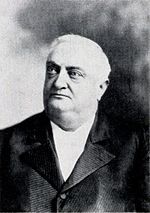Daniel Lindsay Russell, Date of Birth, Place of Birth, Date of Death
TweetDaniel Lindsay Russell
American politician
 Date of Birth: 07-Aug-1845
Date of Birth: 07-Aug-1845
 Place of Birth: Brunswick County, North Carolina, United States
Place of Birth: Brunswick County, North Carolina, United States
Date of Death: 14-May-1908
Profession: judge, lawyer, politician
Nationality: United States
Zodiac Sign: Leo 
About Daniel Lindsay Russell
- Daniel Lindsay Russell Jr.
- (August 7, 1845 – May 14, 1908) was the 49th Governor of North Carolina, serving from 1897 to 1901.
- An attorney, judge, and politician, he had also been elected as state representative and to the United States Congress, serving 1879-1881.
- Although he fought with the Confederacy during the Civil War, Russell and his father were both Unionists.
- After the war, Russell joined the Republican Party in North Carolina, which was an unusual affiliation for one of the planter class.
- In the postwar period he served as a state judge, as well as in the state and national legislatures. Elected on a fusionist ticket in 1896, a collaboration between Republicans and Populists that was victorious over the Democrats, Russell was the first Republican elected as governor in North Carolina since the end of the Reconstruction era in 1877.
- During his term, he approved legislation to extend the franchise by reducing the property requirement; it benefited the white majority in the state as well as blacks. To prevent such a political coalition from being successful again, in the 1898 elections Democrats conducted a campaign of fear, stressing white supremacy, and regained power in the state legislature.
- Democrats in the Wilmington Insurrection of 1898, which took place in the largest city, overthrew the elected, biracial government headed by a white mayor and majority white council, beginning two days after the election.
- Russell's efforts to suppress the white riot were unsuccessful, and mobs attacked black neighborhoods, driving so many blacks permanently from the city that it became majority white. The following year Democrats in the state legislature passed a new constitution over Russell's opposition and without submitting it to voters.
- It disfranchised nearly all blacks and many poor whites.
- As a result, Russell was the last Republican elected as governor in this state until 1973.
Read more at Wikipedia
See Also
- Famous People's Birthdays on 07 August, United States
- Famous People's Birthdays in August, United States
- Famous judge's Birthdays on 07 August, United States
- Famous judge's Birthdays in August, United States
- Famous lawyer's Birthdays on 07 August, United States
- Famous lawyer's Birthdays in August, United States
- Famous politician's Birthdays on 07 August, United States
- Famous politician's Birthdays in August, United States

